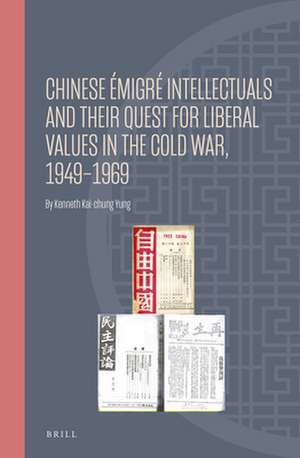Chinese Émigré Intellectuals and Their Quest for Liberal Values in the Cold War, 1949–1969: Ideas, History, and Modern China, cartea 25
Autor Kenneth Kai-chung Yungen Limba Engleză Hardback – 13 oct 2021
Din seria Ideas, History, and Modern China
- 18%
 Preț: 793.41 lei
Preț: 793.41 lei - 18%
 Preț: 831.76 lei
Preț: 831.76 lei - 18%
 Preț: 554.75 lei
Preț: 554.75 lei - 18%
 Preț: 814.92 lei
Preț: 814.92 lei - 18%
 Preț: 820.27 lei
Preț: 820.27 lei - 18%
 Preț: 1238.62 lei
Preț: 1238.62 lei - 18%
 Preț: 1209.35 lei
Preț: 1209.35 lei - 18%
 Preț: 954.70 lei
Preț: 954.70 lei - 18%
 Preț: 1326.96 lei
Preț: 1326.96 lei - 18%
 Preț: 881.51 lei
Preț: 881.51 lei - 18%
 Preț: 605.33 lei
Preț: 605.33 lei - 18%
 Preț: 788.38 lei
Preț: 788.38 lei - 18%
 Preț: 669.22 lei
Preț: 669.22 lei - 18%
 Preț: 666.98 lei
Preț: 666.98 lei - 18%
 Preț: 941.65 lei
Preț: 941.65 lei - 18%
 Preț: 612.73 lei
Preț: 612.73 lei - 18%
 Preț: 610.97 lei
Preț: 610.97 lei - 18%
 Preț: 558.48 lei
Preț: 558.48 lei - 18%
 Preț: 687.15 lei
Preț: 687.15 lei - 18%
 Preț: 856.41 lei
Preț: 856.41 lei - 18%
 Preț: 837.01 lei
Preț: 837.01 lei - 18%
 Preț: 836.25 lei
Preț: 836.25 lei - 18%
 Preț: 685.90 lei
Preț: 685.90 lei
Preț: 669.74 lei
Preț vechi: 816.75 lei
-18% Nou
Puncte Express: 1005
Preț estimativ în valută:
128.15€ • 134.18$ • 106.30£
128.15€ • 134.18$ • 106.30£
Carte indisponibilă temporar
Doresc să fiu notificat când acest titlu va fi disponibil:
Se trimite...
Preluare comenzi: 021 569.72.76
Specificații
ISBN-13: 9789004466036
ISBN-10: 9004466037
Dimensiuni: 155 x 235 mm
Greutate: 0 kg
Editura: Brill
Colecția Brill
Seria Ideas, History, and Modern China
ISBN-10: 9004466037
Dimensiuni: 155 x 235 mm
Greutate: 0 kg
Editura: Brill
Colecția Brill
Seria Ideas, History, and Modern China
Cuprins
Acknowledgements
Introduction: China Rescue, Democratization, and the Émigré Schools of Thought in the Cold War Era
1 The Three Émigré Schools of Thought and Their Adherents
2 Relevance of the Cold War Émigrés to Contemporary China
3 Major Questions to Be Addressed
4 Description of Chapters and Major Findings of the Book
1 Saving China from Communism and Fighting for Democracy: Prioritizing the Two Tasks
1 The Loyal Critic to Chiang Kai-shek: The Case of Xu Fuguan
2 Yin Haiguang and His Pursuit of Democratization
3 Zhang Junmai and His Prioritization of Recovering the Mainland
4 Conclusion
2 The Influence of Cold War Currents on Chinese Émigré Intellectuals
1 Liberals Who Departed from Socialist Tendencies
2 Moderate Socialists Who Remained Consistent in Their Beliefs
3 Cold War Currents as a Stimulus for the Revitalization of Confucianism
4 Conclusion
3 In Search of a Liberal-Scientific Modern China: The Case of Yin Haiguang
1 Yin Haiguang’s Quest for a Revival of the “May Fourth Spirit”
2 Yin Haiguang’s Views on Democracy and Freedom, 1947–1956
3 Conflicts with the New Confucians and the Guomindang Officials
4 Yin Haiguang’s Views on Science in the Late 1950s
5 Yin Haiguang in the 1960s: His Reappraisal of Chinese Culture
6 Conclusion
4 Balancing Tradition and Modernity: The Case of Zhang Junmai
1 The Confucian Dimension of National Reconstruction, 1949–1969
2 Revival of Confucianism as an Aid to Modernization
3 Confucianism and Zhang Junmai’s Political Ideals
4 Conclusion
5 Confucian Ideals for the Chinese Nation with a Liberal Tendency: The Case of Xu Fuguan
1 Xu Fuguan’s Confucian Political Ideals in the 1950s
2 Xu Fuguan’s Cultural Ideals in the Late 1950s and 1960s
3 The 1958 Joint Manifesto on Chinese Culture
4 Conclusion
General Conclusion
Selected Bibliography 191
Introduction: China Rescue, Democratization, and the Émigré Schools of Thought in the Cold War Era
1 The Three Émigré Schools of Thought and Their Adherents
2 Relevance of the Cold War Émigrés to Contemporary China
3 Major Questions to Be Addressed
4 Description of Chapters and Major Findings of the Book
1 Saving China from Communism and Fighting for Democracy: Prioritizing the Two Tasks
1 The Loyal Critic to Chiang Kai-shek: The Case of Xu Fuguan
2 Yin Haiguang and His Pursuit of Democratization
3 Zhang Junmai and His Prioritization of Recovering the Mainland
4 Conclusion
2 The Influence of Cold War Currents on Chinese Émigré Intellectuals
1 Liberals Who Departed from Socialist Tendencies
2 Moderate Socialists Who Remained Consistent in Their Beliefs
3 Cold War Currents as a Stimulus for the Revitalization of Confucianism
4 Conclusion
3 In Search of a Liberal-Scientific Modern China: The Case of Yin Haiguang
1 Yin Haiguang’s Quest for a Revival of the “May Fourth Spirit”
2 Yin Haiguang’s Views on Democracy and Freedom, 1947–1956
3 Conflicts with the New Confucians and the Guomindang Officials
4 Yin Haiguang’s Views on Science in the Late 1950s
5 Yin Haiguang in the 1960s: His Reappraisal of Chinese Culture
6 Conclusion
4 Balancing Tradition and Modernity: The Case of Zhang Junmai
1 The Confucian Dimension of National Reconstruction, 1949–1969
2 Revival of Confucianism as an Aid to Modernization
3 Confucianism and Zhang Junmai’s Political Ideals
4 Conclusion
5 Confucian Ideals for the Chinese Nation with a Liberal Tendency: The Case of Xu Fuguan
1 Xu Fuguan’s Confucian Political Ideals in the 1950s
2 Xu Fuguan’s Cultural Ideals in the Late 1950s and 1960s
3 The 1958 Joint Manifesto on Chinese Culture
4 Conclusion
General Conclusion
Selected Bibliography 191
Notă biografică
Kenneth Kai-chung Yung obtained a Ph.D. in History at the University of Sydney, Australia. He is a historian in modern China and postwar Hong Kong. He has published articles in various journals such as Twentieth-century China, Journal of Chinese Studies and Journal of Chinese Overseas. He is now working at the University of Hong Kong.
